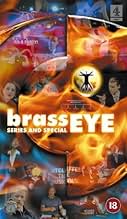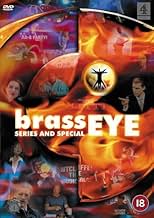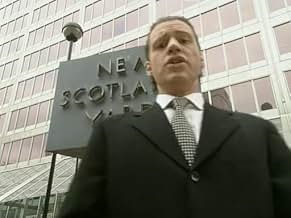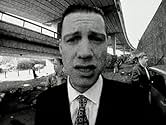अपनी भाषा में प्लॉट जोड़ेंControversial spoof of current affairs television, and the role of celebrity in the UK.Controversial spoof of current affairs television, and the role of celebrity in the UK.Controversial spoof of current affairs television, and the role of celebrity in the UK.
- 2 BAFTA अवार्ड के लिए नामांकित
- 3 कुल नामांकन
एपिसोड ब्राउज़ करें
सारांश
Reviewers say 'Brass Eye' is a groundbreaking media satire that critiques sensationalism and media intelligence. It is noted for its uncomfortable, angry tone and clever use of graphics and music. The series lampoons trash media sensationalism on various subjects, trapping celebrities and politicians. It is considered a powerful assault on 90's media, remaining relevant and often compared to 'The Day Today'. Its subversive nature, controversial content, and ability to provoke thought make it a must-watch for fans of dark, satirical humor.
फ़ीचर्ड समीक्षाएं
In these brightly Orwellian days, where cynical governments can smile 'Trust me...' and know we will fill in the blanks 'I'm lying' and not care; where 'biting' satire is left in the sole hands of a cricket-loving impressionist; where the laurel of 'great comedy' is placed on the head of yet another formulaic spoof of fly-in-the-wall documentaries; in these grimly shining times, Chris Morris is a dark beacon of sense, moral fury, fierce intelligence, intransigent vision; a man of endless, astonishing invention, intimidating energy and a gleefully, pranksterish sensibility.
The problem with today's 'satire' is that it sets up an 'us against them' opposition, in which we snicker with the satirist at a host of immovable, indifferent caricatures. Most of our most prominent satirists are of the same generation, background and ideology of the ruling classes, and their humour has the flavour of locker-room ribbing rather than devastating anger. Most satire consists of an audience talking to itself, reassuring itself of its own worth, its own values against targets so clearly ridiculous they don't really exist. It is satire as easy listening, as reassuring as old socks.
The reason many people don't like Chris Morris is not because of the 'taboo' subject matter he tackles, but because he doesn't play fair, he doesn't play cricket. He never allows the audience the comfort of complacent complicity. if we sneer at another hapless celebrity duped into piously anguishing over some preposterous non-issue in an obscene public gesture of their own ethical value and depth, we are stating that we are truly 'authentic', that we would never be caught out, that our values are sound. And then Morris will insert a crass joke that strips away the warm cloak of lazy irony - an imitation of the author of 'A Brief History of Time', for instance - that repels us, shakes us out of a cosy 'us vs them' mentality, forcing us to face up to the complexity of what we're watching, or - shock, horror! - think for ourselves.
When I was watching the 'Brass eye' repeats recently, I was struck by how little they had dated, how exhilirating and intellectually stimulating, as well as cripplingly funny, they still were. Surely a media satire, with its inbuilt topicality, should become instantly anachronistic. You could argue that this is a damning indictment of a media that hasn't changed its mind-numbing habits in the last half-decade. I would argue, however, that 'Brass eye' is not really a media satire at all, or is not one fundamentally, despite its destructively accurate potshots at sensationalism, the paucity of media intelligence, a culture with a media that no longer records or reflects reality, but actually creates it, as in the recent case of a major Sunday newspaper printing photos of paedophiles, encouraging the public to savage them, conveniently creating the next morning's news. This is all an essential part of what 'Brass eye' does.
But it is more than that. Morris is our century's Jonathan Swift, and last week's 'Brass eye special' on media hysteria about paedophilia was his 'A Modest Proposal', a satire so savage, so angry, so uncomfortable, so ironic in the true, original sense of that phrase, that people mistook the satire for its object, because Morris held up a mirror to our society, a totalitarian, propaganda-corrupt culture posing as a democracy; and to ourselves, we who conceal brutal, fascist instincts under a guise of ethical concern. We didn't like it, and rather than acknowledge our own darkness, we tried to smash the mirror. Like Swift, Morris has always been more concerned with language and ontology than the media per se, the way words no longer mean what they are supposed to mean, in the way the advance of media technology has created an illusionistic world in which 'real' people have to live, in which we try to make the illusion real, to devastating results. And yet, again like Irishman, the sheer invention with which Morris records this communicative decadence channelled through language, liberates and gives some hope - but only if we accept the challenge of 'Brass eye'.
The problem with today's 'satire' is that it sets up an 'us against them' opposition, in which we snicker with the satirist at a host of immovable, indifferent caricatures. Most of our most prominent satirists are of the same generation, background and ideology of the ruling classes, and their humour has the flavour of locker-room ribbing rather than devastating anger. Most satire consists of an audience talking to itself, reassuring itself of its own worth, its own values against targets so clearly ridiculous they don't really exist. It is satire as easy listening, as reassuring as old socks.
The reason many people don't like Chris Morris is not because of the 'taboo' subject matter he tackles, but because he doesn't play fair, he doesn't play cricket. He never allows the audience the comfort of complacent complicity. if we sneer at another hapless celebrity duped into piously anguishing over some preposterous non-issue in an obscene public gesture of their own ethical value and depth, we are stating that we are truly 'authentic', that we would never be caught out, that our values are sound. And then Morris will insert a crass joke that strips away the warm cloak of lazy irony - an imitation of the author of 'A Brief History of Time', for instance - that repels us, shakes us out of a cosy 'us vs them' mentality, forcing us to face up to the complexity of what we're watching, or - shock, horror! - think for ourselves.
When I was watching the 'Brass eye' repeats recently, I was struck by how little they had dated, how exhilirating and intellectually stimulating, as well as cripplingly funny, they still were. Surely a media satire, with its inbuilt topicality, should become instantly anachronistic. You could argue that this is a damning indictment of a media that hasn't changed its mind-numbing habits in the last half-decade. I would argue, however, that 'Brass eye' is not really a media satire at all, or is not one fundamentally, despite its destructively accurate potshots at sensationalism, the paucity of media intelligence, a culture with a media that no longer records or reflects reality, but actually creates it, as in the recent case of a major Sunday newspaper printing photos of paedophiles, encouraging the public to savage them, conveniently creating the next morning's news. This is all an essential part of what 'Brass eye' does.
But it is more than that. Morris is our century's Jonathan Swift, and last week's 'Brass eye special' on media hysteria about paedophilia was his 'A Modest Proposal', a satire so savage, so angry, so uncomfortable, so ironic in the true, original sense of that phrase, that people mistook the satire for its object, because Morris held up a mirror to our society, a totalitarian, propaganda-corrupt culture posing as a democracy; and to ourselves, we who conceal brutal, fascist instincts under a guise of ethical concern. We didn't like it, and rather than acknowledge our own darkness, we tried to smash the mirror. Like Swift, Morris has always been more concerned with language and ontology than the media per se, the way words no longer mean what they are supposed to mean, in the way the advance of media technology has created an illusionistic world in which 'real' people have to live, in which we try to make the illusion real, to devastating results. And yet, again like Irishman, the sheer invention with which Morris records this communicative decadence channelled through language, liberates and gives some hope - but only if we accept the challenge of 'Brass eye'.
I've just become a fan of Brass Eye after seeing the DVD at a friends house, I have to say it is brilliant and there is no doubt in my mind as to why so many people were against the show. Brass eye shows how the media manipulates and exploits situations to tell you the viewer just what to think about everything. It is a satire on Panarama type shows where all the facts are laid out straight for everyone to see, that way everyone can agree that something is wrong, let's say "drugs" for example. The most controversial, maybe the funniest episode is the episode on Paedophelia. If only people realised that not only do the media promote and fuel paedophelia (just look through the papers, counting down the days that Mary Kate and Ashley became legal, Britney Spears first video, definite exploitation of Paedophelia). The media also speaks out against it, in around 2001 they used the subject spread hatred and fear, everyone was a suspected Paedophile. This is where I believe the humour lies in the show, it is not making fun of the serious issues but it is making fun of the way the Media uses these issues and will exploit them to their own advantage. A very clever and a very funny satire.
With such modern stuff as Phoenix nights and The Office this is often overlooked nowadays but there's no doubting the power this had when made. Its a lot more controversial, perhaps the most controversial piece of satire seen on British television. Especially the Paedogedden episode which is on the DVD along with the original series. It caused a media uproar when the point was missed entirely, specifically the medias obsession with the topic of paedophilia and a victim obsessed society, True though it isn't the funniest, i would give that to the Drugs and animals episodes though all have a very strong angry message, People like Chris Morris are vital and he deserves praise for the vision and the bravery to make the show. (The celebrities tricked into appearing on the show are also a highlight throughout) The over the top graphics and deadpan style of it also adds to the show greatly.
Absolutely recommended though not for the easily offended or shallow minded.
Absolutely recommended though not for the easily offended or shallow minded.
More Jokes, One Liners, Insanity, Nonsense, Scathing Insight, Mockery, Satire, Offence, and Total Wrongness wrapped up in a Bitesize of 30 minutes than anything that has ever been previously created in the history of time and space.
Pushing the boundaries of Televisual Entertainment above and Beyond anything anyone would ever have expected. They actually had a question raised in Parliament about "Cake"! The endless stream of "Celebs" quoting ridiculous statements about the abuse of "Cake".
Probably my favourite part of this show is the visual graphic and statistics they employ. Wonderful!
Pushing the boundaries of Televisual Entertainment above and Beyond anything anyone would ever have expected. They actually had a question raised in Parliament about "Cake"! The endless stream of "Celebs" quoting ridiculous statements about the abuse of "Cake".
Probably my favourite part of this show is the visual graphic and statistics they employ. Wonderful!
10ElWormo
Brass Eye is the last word in media satire. There certainly hasn't been anything to even touch on its level of inspired, demented genius since it went out, and watching it today this nearly 18 year old program makes everything on TV now look hackneyed and dated. The attention to detail in all the sketches is mindblowing. The celeb duping is utterly ridiculous, how any of them worked again is a mystery (I kind of wish he hadn't gone for 2 of my all time heroes Gary Lineker and Tommy Vance, but even their sections are insanely funny, in particular Vance's guide to 'Prison Slang'). Believe the hype: Seven glorious episodes of head-mashing hilarity that ring as true today as they did back then. Essential.
क्या आपको पता है
- ट्रिवियाThe Paedogeddon Special is the third most complained-about episode of television ever (first and second are the Jerry Springer Opera and Big Brother 2000).
- भाव
Christopher Morris: You're wrong, and you're a grotesquely ugly freak!
- इसके अलावा अन्य वर्जनWhen the show first aired in 1997, some of the more controversial sketches were cut on the orders of the then-head of Channel 4 programming Michael Grade, most notably a piece concerning a musical based on the life of and starring the serial killer Peter Sutcliffe. The edition of the show in which the sketch would have featured was allegedly broadcast containing a onscreen subliminal message lasting 1/25 of a second that read "Grade is a cunt". The series was repeated in 2001 with the Sutcliffe sketch and some other material shown uncut, and with the subliminal message removed.
- कनेक्शनFeatured in Storm Over 4 (1998)
टॉप पसंद
रेटिंग देने के लिए साइन-इन करें और वैयक्तिकृत सुझावों के लिए वॉचलिस्ट करें
- How many seasons does Brass Eye have?Alexa द्वारा संचालित
विवरण
इस पेज में योगदान दें
किसी बदलाव का सुझाव दें या अनुपलब्ध कॉन्टेंट जोड़ें

































